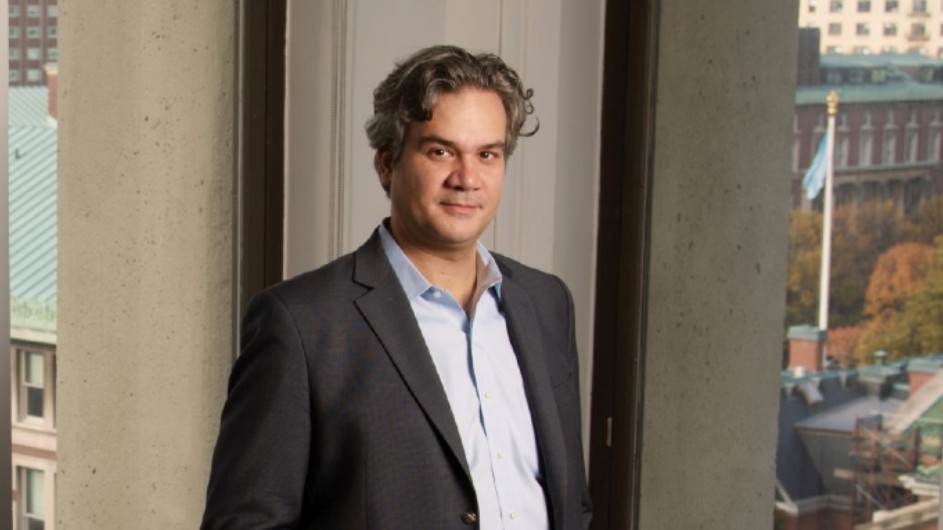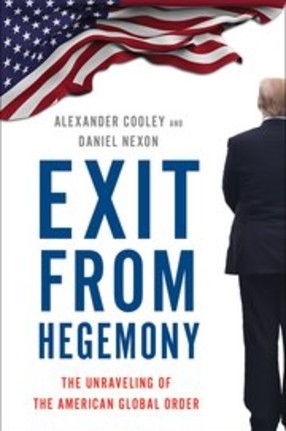Can America’s Global Leadership Survive?
Alexander Cooley's Exit from Hegemony examines the US international system from the end of World War II to President Donald Trump.

Q. You have stated that American hegemony is ending. Tell us why.
A. American hegemony is unravelling because the United States is no longer the "monopolist” in international affairs that it was in the 1990s. It was the main supplier of ideas and expertise immediately following the Soviet collapse, but the U.S. role is now challenged and contested in all these areas. Other countries, especially China, now provide international services such as development assistance and investment. New regional organizations like the Shanghai Cooperation Organization promote the agendas and values of competitors like China and Russia. The once dominant networks of Western-funded NGOs spreading liberal principles and values are actively being blocked by governments and contested by illiberal counterparts. Liberal democracy is no longer a fashionable political system for countries to emulate. Moreover, increasing polarization within the U.S. has undermined its ability to promote the international liberal order. The U.S. is still the most powerful state in the world—militarily and financially—but it is no longer a global hegemon, with the capacity to unilaterally shape and dictate the nature of international affairs.
Q. How has the COVID-19 pandemic shifted the global power balance?
A. COVID has magnified and accelerated several of these trends. The U.S.’s image as a global leader has been further undermined by its relatively ineffective domestic response and withdrawal from the World Health Organization (WHO) in the midst of a pandemic. The lack of U.S. leadership in coordinating a more robust global response has been widely interpreted as irresponsible and counterproductive. In contrast, China, despite being the country of the COVID-19 origin and covering up details of the virus outbreak, has attempted to rebrand itself as a global provider of emergency health goods worldwide, while publicly stressing the need for international cooperation in global public health.
Q. What are the main concerns for U.S. relations with China and Russia?
A. China and Russia undermine U.S. hegemony in multitiered ways. They have established new regional and international organizations, such as the Asian Infrastructure Investment Bank and the Eurasian Economic Union. They have sought to undermine and divide the censuses with the West on issues like partnering with China on 5G technology or rolling back sanctions imposed against Russia for its actions in Ukraine. Each has undertaken important new individual initiatives: Russia’s intervention in Syria promoted an image that Moscow would defend political clients even outside of the post-Soviet region, while China’s one trillion-dollar Belt and Road Initiative (BRI) is as much an infrastructure investment program in more than 70 countries as it is an attempt to create more-China friendly partnerships and communities in foreign affairs. These efforts create new networks of geopolitical influence and feedback on existing power structures. For example, in June 2017, Greece—now a major BRI partner for China—refused to sign off on an E.U. statement that would have criticized Beijing’s human rights practices.
How Hegemony Ends: The Unraveling of American Power
Q. How do you see the future of international leadership, including IGOs such as the United Nations and WHO?
A. The Trump administration uses its public disdain for multilateral institutions, like the U.N., as a bargaining tactic. Threatening to defund or withdraw from international agreements can sometimes be leveraged to obtain greater voice and control in international organizations. This tactic, however, can backfire if other countries are willing to substitute for U.S. funding and influence. In the case of the WHO, U.S. withdrawal created a vacuum for China to fill, especially during a global pandemic, where the international body, despite its problems, is viewed as indispensable for global health cooperation and information exchange.
Far from being sideshows or irrelevant bodies, U.N. agencies are essential arenas of geopolitical competition. The Trump administration belatedly recognized this by appointing, earlier this year, a Special Envoy to counter Chinese influence at the U.N., but this will do little on its own if Washington keeps withdrawing and defunding these institutions.
Q. What is Trump's impact on the liberal order, domestically and globally?
A. Trump is not the root cause of the unravelling of the liberal order, but he is a symptom and an accelerant. Trump is actively dismantling many U.S. power resources and infrastructures such as taking a more confrontational and transactional approach with traditional allies within NATO and East Asia. At the same time, Trump’s own illiberal rhetoric and support for global strongmen helps to delegitimize the importance of liberal principles in other countries and across global governance institutions.
Q. Share with us a short list of books for summer reading.
A. Here are some of my favorite recent reads.
Gods of the Upper Air: How a Circle of Renegade Anthropologists Reinvented Race, Sex and Gender in the 20th Century by Charles King, this year’s winner of the Francis Parkman Prize, is a beautifully written account of the life and work of Franz Boas, who challenged scientific racism and the assumptions that widely informed U.S. immigration and education policy.
The War Within: Diaries From the Siege of Leningrad by Alexis Peri is a deeply disturbing dive into the social history of the World War II siege of Leningrad, as told through wartime diaries. Challenging the widely held view that memorializes the siege as an act of national unity, the book provides harrowing accounts of the deconstruction and dehumanization of various social units, including families and the choices some made to survive.
Moneyland: Why Thieves and Crooks Now Rule the World and How to Take It Back by Oliver Bullough, an anti-corruption journalist, takes the reader across the array of Western actors and service industries—including luxury real estate brokers, shell company providers and lawyers—who play a role in enabling the grand corruption and kleptocracy that has systemically looted countries in the former Soviet Union and Africa.
Yellow Star, Red Star: Holocaust Remembrance After Communism by Jelana Subotic is a deftly handled exploration of the tricky topic of post-Communist memory politics and how contemporary East European and Balkan governments—particularly Croatia, Serbia and Lithuania—have used the Holocaust to advance their own national histories and myths of genocide and selective victimhood.
Lastly, Jason Sharman’s Empires of the Weak: The Real Story of European Expansion and the Creation of the New World Order is almost an instant revisionist classic. Sharman boldly reinterprets how and why European imperial powers managed to conquer most of the world, refuting standard accounts that emphasize European technological innovation and military superiority. Instead, Sharman focuses on the spread of disease, cooptation, bribery and local collaboration, arguing that late 19th century European imperialism was anomalous, as 21st century world politics is now shifting back to the norm of non-western power centers like China.
Q. What's your plan for the 2020 U.S. election night?
A. Well, I’m no U.S. politics specialist but I am a politics junkie, so election nights tend to be quite personal as I bunker down with my laptop and try to look at a range of returns and races. I think that this year the whole world will be watching the November election as a key moment in not only U.S. history but also global politics. So, I’m sure I’ll be on the phone with relatives in Greece and France, as well as interested colleagues in Russia, soon after the results are in.
Alexander Cooley, the Claire Tow Professor of Political Science at Barnard College and the director of Columbia University's Harriman Institute, is the co-author, with Daniel Nexon, of Exit from Hegemony: the Unravelling of the American Global Order (Oxford University Press, 2020), co-authored with Daniel Nexon.
